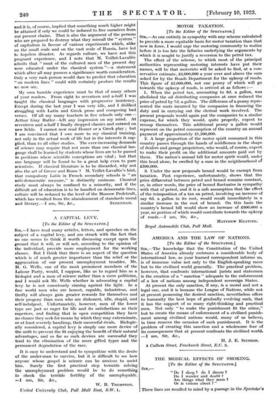A CAPITAL LEVY.
[To the Editor of the SPECTATOR.] have read many articles, letters, and speeches on the subject of a capital levy, and am struck with the fact that no one seems to think it worth discussing except upon the ground that it will, or will not, according to the opinion of the individual, provide more employment for the working classes. But I think that there is an aspect of the question which is of much greater importance than the relief or the aggravation of our present unemployment troubles. Mr. B. G. Wells, one of the most prominent members of the Labour Party, would, I suppose, like us to regard him as a biologist and a man of science rather than a mere politician, and I would ask Mr. Wells whether in advocating a capital levy he is not consciously sinning against the light. In a free world men who are honest, capable, industrious, and thrifty will always gain greater rewards for themselves and their progeny than men who are dishonest, idle, stupid, and self-indulgent. Unfortunately, however, men of the lower type are just as eager for life and its satisfactions as their superiors, and finding that in open competition they have no chance they seek for means by which they may exterminate, or at least severely handicap, their successful rivals. Biologic- ally considered, a capital levy is simply one more device of the unfit to prevent the fit enjoying the benefit of their natural advantages, and so far as such devices are successful they • tend to the elimination of the more gifted types and the permanent degradation of the race.
It is easy to understand and to sympathize with the desire of the under-man to survive, but it is difficult to see how anyone whose gospel is science can be anxious to assist him. Surely the first practical step towards solving the unemployment problem would be to do something to check the terrible fertility of the unemployable.
am, Sir, &c., W. B. THOMPSON.
United University Club, Pall. Mall East, S.W. 1.


































































 Previous page
Previous page